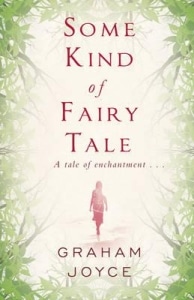Some Kind Of Fairy Tale by Graham Joyce (book review).
The difference between a writer of fantasy and a mainstream writer can be so negligible that it only happens in the perception of the reader. When critically acclaimed writers produce what SF critics would regard as genre material, the author may wave away the implied condemnation by declaring that they were using SF/fantasy/supernatural tropes as metaphor or in order to make a point about society. Bram Stoker probably didn’t see anything unusual in writing ‘Dracula’. He was drawing on folklore to warn of the dangers of female sensuality in a Victorian society. He would have been shocked by the supernatural fiction his original story spawned, especially the raunchier volumes.
While Stoker has been claimed for the horror genre by subsequent developments in literature and not everyone would agree they were for the better, Graham Joyce is happy straddling the boundary. His books have been claimed equally by the genre readership and the mainstream. He is a clever, subtle writer whose insight into the psyche’s of his characters lifts his novels out of the ordinary. It can be argued that there is always a touch of fey about his work as he writes with obvious delight even about subjects that are serious in their own right. Even the title ‘Some Kind Of Fairy Tale’ is an indication that he playing with the minds and perceptions of not just his characters but with his readers and critics as well.
This novel begins in an ordinary enough way. Mary and Dell Martin are a retired couple settling down to Christmas dinner when there is a knock on the door. They open it to find a young woman on the threshold who claims to be their daughter. Tara disappeared twenty years before in a spring when bluebells carpeted the nearby Otherwoods. Tara knows all the intimate details of family life when she was fifteen and says, that for her, only six months have passed. Once her parents and her brother, Peter, accept that she is Tara there are still problems. They are people grounded in reality and are not prepared to believe her story despite the fact that she has no memory at all of the last twenty years, nor of where she has been, the advancement of technology or world events. Neither has she appeared to have aged at all. She does though agree to see a psychiatrist.
Tara’s story is that she was abducted by ‘fairies’ and although she only spent six months in their realm, twenty years passed in ours. Everyone around her is very sceptical of her version of events, despite the very detailed account she gives of her life in the otherworld. She adjusts to her life with her family without difficulty but it is rather different for her family. To begin with, her brother’s children are delighted with their new aunt, though his wife is a little more sceptical. Then there is Richie, the boyfriend she left behind. While Tara has not physically aged, Richie is mentally the same person he was, a musician who has not moved on from his teen-age dreams. At the time of her disappearance, Richie was accused of her murder and although he was never charged, he was ostracised by Tara’s family. Her vanishing changed lives, her reappearance throws them into tumult again.
As explained in the text, there are medically recorded instances where trauma has caused the aging process to apparently cease. Thus, along with a vivid imagination and a genuine case of amnesia, there is a rational explanation for the events in this book. At the same time, aficionados of fantasy and the believers of some truth in folklore have plenty here to take to their hearts. Truth is always a strange thing and whatever facts there are, they can so easily be distorted or misinterpreted, wilfully or otherwise. It is part of Joyce’s skill in weaving a tale such as this that either or both versions can be accepted without detracting from the other. I would have no hesitation in recommending this or any other of Joyce’s books to any reader whether they are a believer or not in the validity of the fantasy genre.
Pauline Morgan
(pub: Gollancz. 389 page small hardback. Price: £ 9.99 (UK). ISBN: 978-0-575-11528-6. Ebook: £ 5.99 (UK))
check out websites: http://www.orionbooks.co.uk/ and www.grahamjoyce.net

